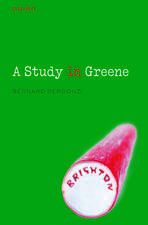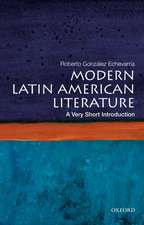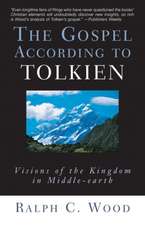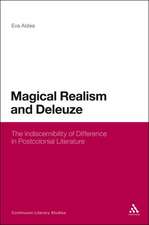Maggie Gee: Writing the Condition-of-England Novel
Autor Dr Mine Özyurt Kiliçen Limba Engleză Paperback – 7 mai 2014
| Toate formatele și edițiile | Preț | Express |
|---|---|---|
| Paperback (1) | 255.66 lei 43-57 zile | |
| Bloomsbury Publishing – 7 mai 2014 | 255.66 lei 43-57 zile | |
| Hardback (1) | 772.65 lei 43-57 zile | |
| Bloomsbury Publishing – 21 noi 2012 | 772.65 lei 43-57 zile |
Preț: 255.66 lei
Preț vechi: 294.43 lei
-13% Nou
Puncte Express: 383
Preț estimativ în valută:
48.92€ • 51.21$ • 40.72£
48.92€ • 51.21$ • 40.72£
Carte tipărită la comandă
Livrare economică 31 martie-14 aprilie
Preluare comenzi: 021 569.72.76
Specificații
ISBN-13: 9781472571618
ISBN-10: 1472571614
Pagini: 192
Dimensiuni: 156 x 234 x 10 mm
Greutate: 0.27 kg
Editura: Bloomsbury Publishing
Colecția Bloomsbury Academic
Locul publicării:London, United Kingdom
ISBN-10: 1472571614
Pagini: 192
Dimensiuni: 156 x 234 x 10 mm
Greutate: 0.27 kg
Editura: Bloomsbury Publishing
Colecția Bloomsbury Academic
Locul publicării:London, United Kingdom
Caracteristici
Close readings of Gee's texts in the context of broader debates about race, gender, class.
Notă biografică
Mine Özyurt Kiliç is Associate Professor in the Department of English Language and Literature at Dogus University, Istanbul, Turkey.
Cuprins
PrefaceAcknowledgementsList of Abbreviations Part 1: Introduction1. Contextualising Maggie Gee's Fiction Part 2: Major Works 2. Author Flinging Herself From the Ivory Tower: Dying, In Other Words 3. Of the Nuclear Family and the Hibakusha: The Burning Book4. Telescopic View of England, England: Light Years5. Hard Times: Grace and Where Are the Snows6. Are Such Things Done on Albion's Shore?: Lost Children 7. Environmental Crisis, from Fact to Fiction: The Ice People and The Flood8. Of the Two Nations: The White Family9. Authorship in a Globalised World: My Cleaner and My DriverPart 3: Criticism and Contexts10. Author InterviewNotes BibliographyIndex
Recenzii
One can end here with hope, as Gee's novels so often do, that Kiliç's attention to her work raises her profile, promotes wider reading of her fiction, and aids the enacting of its wish that it might change readers' opinions and actions enough to have palpable effects on the betterment of humankind, in Britain and beyond. It certainly has the power to do so.
Mine Özyurt Kiliç perceptively demonstrates that Gee blends the tradition of the Victorian social problem novel with experimental literary techniques to examine pressing social and environmental issues in late twentieth century and contemporary Britain. The first full-length study of her fiction, this excellent analysis of Gee's themes, concerns, style, and craft, gives an important British writer the long-overdue critical attention she deserves.
Combining close reading of texts with thematic discussion, Mine Özyurt Kiliç creates a comprehensive and intellectually stimulating account of Maggie Gee's fiction. Her analysis of Gee's work in the context of the condition-of-England novel and related cultural/social topics is perceptively argued. The study, and the interview with Gee it introduces, will prove invaluable to students and researchers.
Mine Ozyurt Kilic's Maggie Gee makes an entirely convincing argument for Gee's importance as one of our most interesting contemporary writers. Kilic contends that Gee's fiction inherits yet rewrites the tradition of the Condition of England novel, and debates the relationship between modernist self-referentiality and ethical engagement to create what she terms a 'self-conscious' realism. The book also carefully elaborates her interest in questions of authorship within the contemporary culture industry, the importance of family and the connections between ecological issues and ethnic and racial rivalries. What runs through all her works, Kilic argues, is an ethics of connection that ultimately transforms the relationship between individuals and their larger collectives. This is a wonderfully rich and well-informed exploration of Maggie Gee's work.
Özyurt Kilic's book should be warmly welcomed. Indeed, the questions it poses about the connections between social engagement and narrative innovation are helpfully provocative and it focuses us on the importance of Gee's voice in the contemporary literary landscape.
Mine Özyurt Kiliç perceptively demonstrates that Gee blends the tradition of the Victorian social problem novel with experimental literary techniques to examine pressing social and environmental issues in late twentieth century and contemporary Britain. The first full-length study of her fiction, this excellent analysis of Gee's themes, concerns, style, and craft, gives an important British writer the long-overdue critical attention she deserves.
Combining close reading of texts with thematic discussion, Mine Özyurt Kiliç creates a comprehensive and intellectually stimulating account of Maggie Gee's fiction. Her analysis of Gee's work in the context of the condition-of-England novel and related cultural/social topics is perceptively argued. The study, and the interview with Gee it introduces, will prove invaluable to students and researchers.
Mine Ozyurt Kilic's Maggie Gee makes an entirely convincing argument for Gee's importance as one of our most interesting contemporary writers. Kilic contends that Gee's fiction inherits yet rewrites the tradition of the Condition of England novel, and debates the relationship between modernist self-referentiality and ethical engagement to create what she terms a 'self-conscious' realism. The book also carefully elaborates her interest in questions of authorship within the contemporary culture industry, the importance of family and the connections between ecological issues and ethnic and racial rivalries. What runs through all her works, Kilic argues, is an ethics of connection that ultimately transforms the relationship between individuals and their larger collectives. This is a wonderfully rich and well-informed exploration of Maggie Gee's work.
Özyurt Kilic's book should be warmly welcomed. Indeed, the questions it poses about the connections between social engagement and narrative innovation are helpfully provocative and it focuses us on the importance of Gee's voice in the contemporary literary landscape.





















